| | | | | | | Presented By Celadon Books | | | | Axios World | | By Dave Lawler ·Oct 26, 2020 | | Welcome back to Axios World. - Tonight's journey (1,548 words, 6 minutes) begins in the Caucasus, swings through Tanzania and ends in a small town in Russia.
Subscribe here if you haven't, and tell a friend. | | | | | | 1 big thing: No peace for Nagorno-Karabakh | 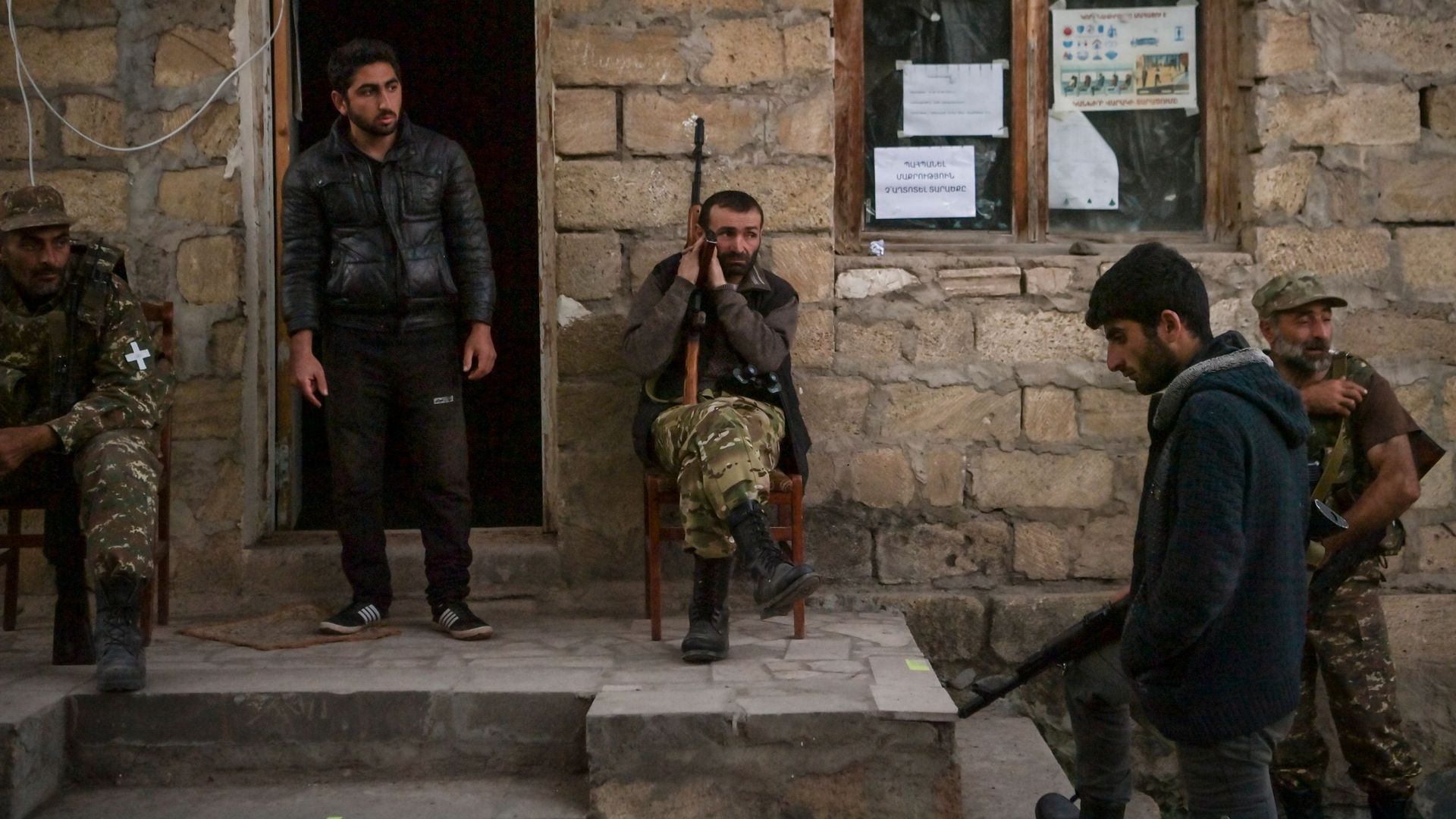 | | | Volunteer fighters in Stepanakert, the capital of Nagorno-Karabakh. Photo: Aris Messinis/AFP via Getty Images | | | | A U.S.-brokered ceasefire in Nagorno-Karabakh crumbled within hours today, leaving the month-old war rumbling on. - "The efforts of the international community, this time brokered by the United States, to establish a ceasefire, have failed," Armenian Prime Minister Nikol Pashinyan said tonight.
- Azerbaijan President Ilham Aliyev, meanwhile, declared today that his country was "fed up" with "almost 30 years" of failed diplomacy. Military force was required to create "a new reality," he said.
- Two previous ceasefires negotiated by Russia also broke down within minutes.
Why it matters: Nearly 5,000 people have been killed, according to Vladimir Putin's rough estimate, including more than 100 civilians. Between 70,000 and 100,000 more are believed to have fled the fighting. The big picture: Nagorno-Karabakh is a self-governing, majority ethnic Armenian enclave that lies entirely within Azerbaijan's borders. The conflict over the territory dates back a century and flared up at either end of the Soviet era, Thomas de Waal writes in Foreign Affairs. - In 1921, the region was placed within Soviet Azerbaijan by the Soviet Caucasus Bureau, led by Joseph Stalin, but granted relative autonomy, de Waal writes.
- In 1991, as the USSR was collapsing and the post-Soviet borders were hardening, Armenia and Azerbaijan went to war over the territory.
- Armenia prevailed in 1994, "taking control not just of Nagorno-Karabakh itself but also of seven surrounding Azerbaijani territories," de Waal writes.
- Since then, international mediators have helped put down a series of clashes but left in place a status quo that Azerbaijan bitterly rejects.
What's happening: Spurred on by its ally Turkey, Azerbaijan last month launched the most ambitious offensive seen in the conflict since the 1990s. It has reclaimed a number of villages lost in that war. - On the one hand: "Baku [Azerbaijan] has little incentive to agree to peace talks, which they say did not produce any kind of results for such a long time," says Olesya Vartanyan of the International Crisis Group.
- On the other: Armenia has called for international mediation, in particular from its military ally Russia. Putin has been involved but in the role of neutral arbiter, pointedly noting that Russia's alliance with Armenia doesn't apply outside its borders.
- The latest: In the most significant U.S. intervention to date, Secretary of State Mike Pompeo met with the foreign ministers of both countries on Friday. His deputy Stephen Biegun finalized a ceasefire deal, which President Trump predicted would save many lives. It quickly collapsed today.
On the ground: "In Stepanakert — the now nearly empty capital of the self-styled ethnic Armenian Artsakh Republic — the remaining residents spend their nights cowering in makeshift shelters that are often little more than musty cellars under aging Soviet apartment blocks," Simon Ostrovsky reports for Newlines Magazine. - Azerbaijan's offensive has been powered by drones purchased from Turkey and Israel.
- The Azeri advance is challenging the long-standing Armenian belief that they are "the superior warriors" and will have Russia on their side when it counts, Ostrovsky reports.
- Not only has Aliyev rejected the old status quo, Ostrovsky notes, he's also vowed to push beyond the occupied formerly Azeri villages.
What to watch: "If the Azerbaijani advance is slowed by winter or highland geography, the conflict could turn into a slow war of attrition around Nagorno-Karabakh itself, where Armenian forces are still dug in," de Waal writes. |     | | | | | | 2. Global news roundup | 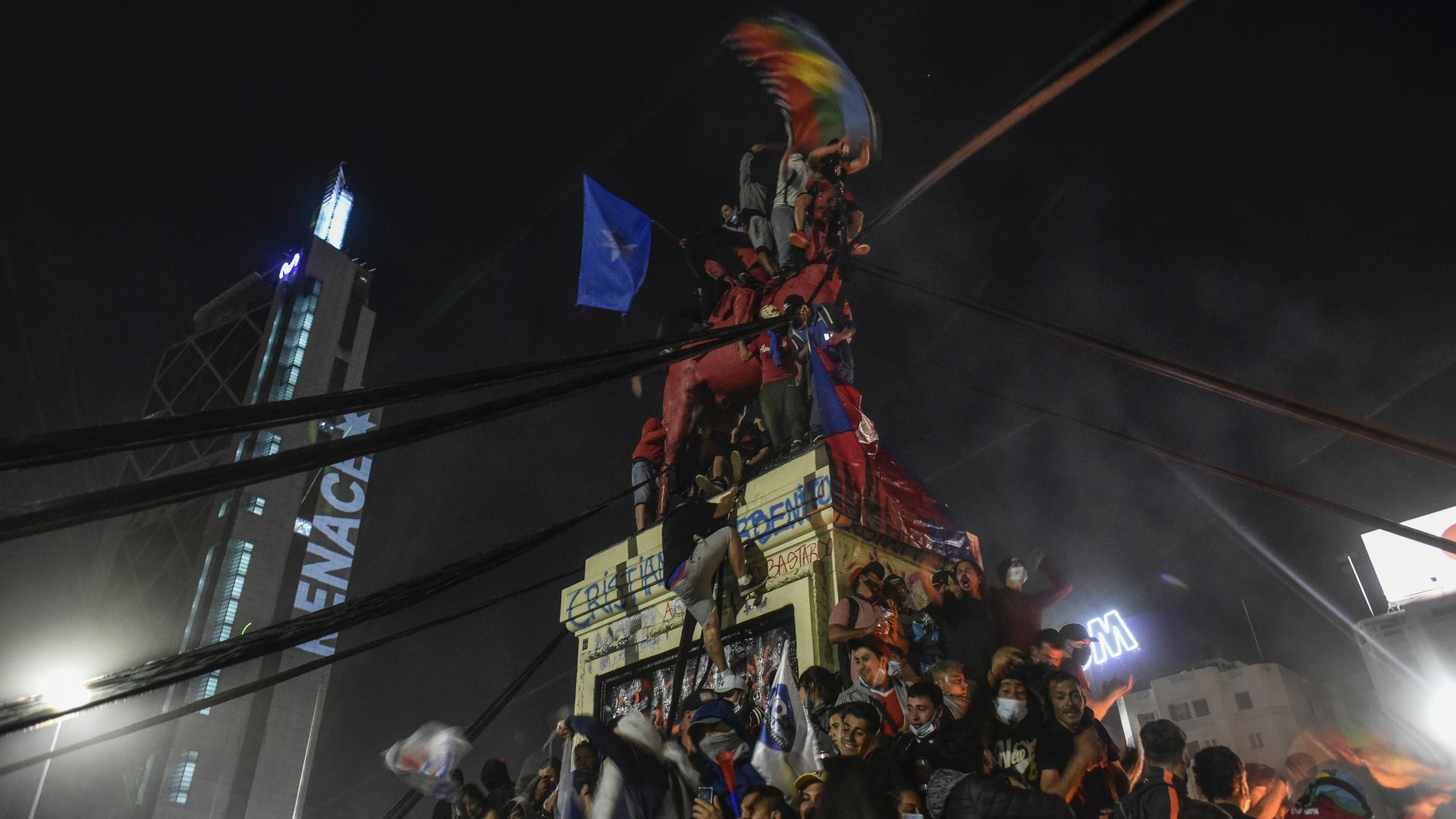 | | | Celebrating in Santiago, Chile. Photo: Claudio Santana/Getty Images | | | | 1. The UN has brokered a "permanent ceasefire" in Libya, 14 months after renegade general Khalifa Haftar mounted an offensive on the internationally recognized government in Tripoli. - Why it matters: It's unclear exactly how "permanent" the ceasefire will prove to be.
- Turkish President Recep Tayyip Erdoğan, the main military backer of the Tripoli government, has said peace "does not seem too achievable."
- Haftar is backed by Russia, the UAE and Egypt. The UN has called on all foreign forces to pull out within three months.
2. Belarus' President Aleksandr Lukashenko has ignored a "people's ultimatum" to resign by today or face mass strikes. - The demand was presented by exiled challenger Svetlana Tikhanovskaya as an attempt to up the ante after 11 weeks of mass protests.
- There have been reports of strikes at schools and factories, but the government says state industrial operations continue uninterrupted.
- Protesters again filled the streets of Minsk on Sunday. Police used stun grenades and arrested 523 people.
3. 78% of Chilean voters opted to scrap their constitution on Sunday in a landmark referendum that followed mass protests last year. - "The result set off wild celebrations in the capital and other cities across the country. Thousands of people flocked onto the streets of Santiago amid horn-blaring to celebrate victory for the 'Approve' campaign within minutes of the polls closing," DW reports.
- The constitution dates back to the regime of dictator Augusto Pinochet, and critics claim it failed to protect indigenous people and has effectively entrenched deep inequality in society.
- What's next: A constituent assembly will be elected next April and then have one year to draft a new constitution.
|     | | | | | | 3. State of the outbreak: Europe clamps down | 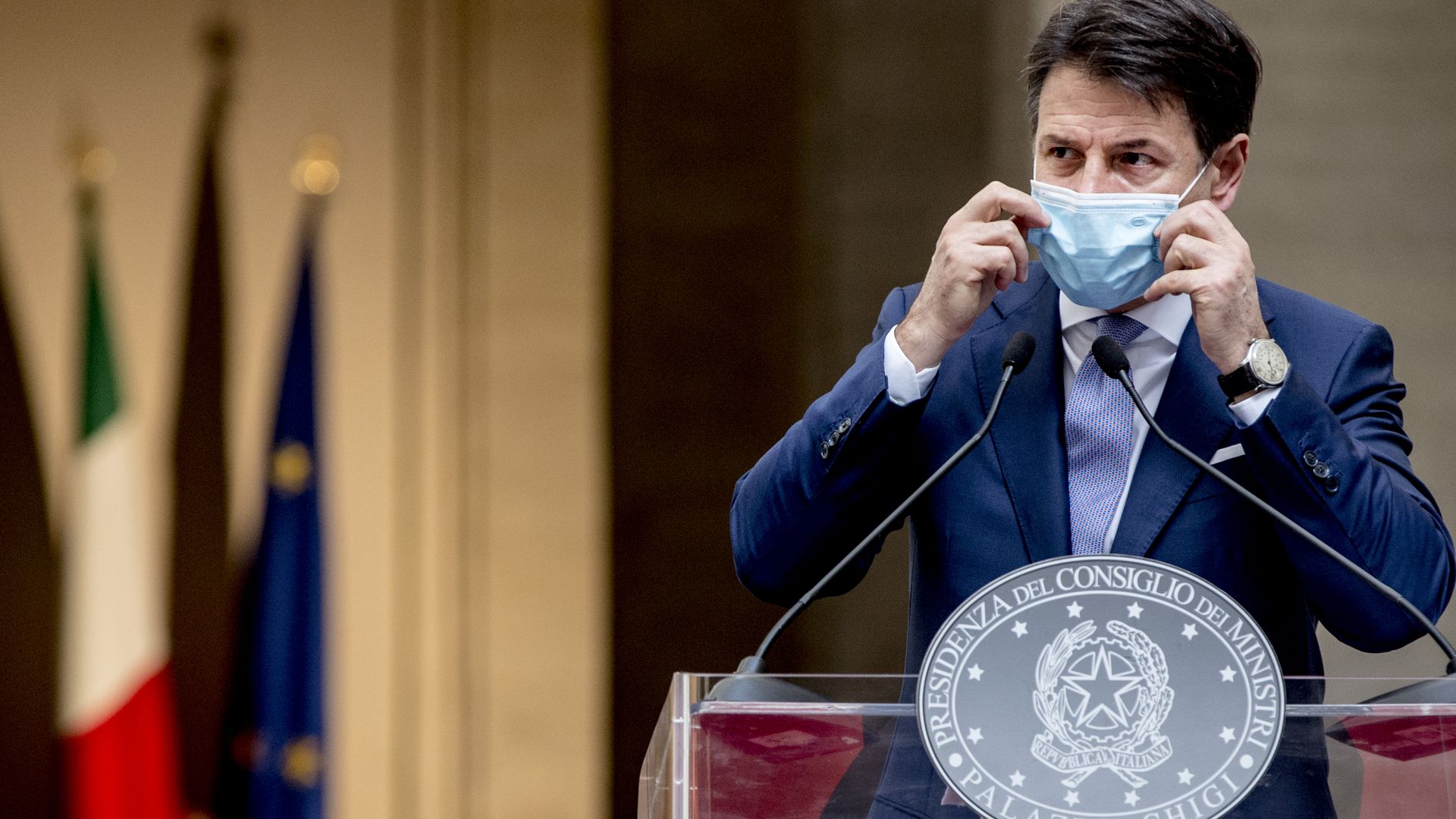 | | | Conte breaks the news. Photo: Corbis via Getty Images | | | | It's beginning to look a lot like lockdown across much of Europe. The latest: As of today, bars and restaurants must close by 6pm across Italy, while cinemas and gyms must shut down altogether. Shops will remain open for now. - Prime Minister Giuseppe Conte said the steps were necessary for Italy to "be able to breathe again in December."
- The news was met by protests in Rome and Naples led by workers from affected industries, per Bloomberg. The government plans to pass a new $5.9 billion relief package this week.
Spain declared a state of emergency on Sunday, with a new curfew in place from 11pm to 6am. Ominously, the state of emergency could last up to six months. - Countries including France, the Czech Republic and the Netherlands continue to record record-high case counts.
- German Chancellor Angela Merkel is reportedly considering nationwide closures of all bars, restaurants and public events.
- Polish President Andrzej Duda has become the latest leader to test positive for the virus.
|     | | | | | | A message from Celadon Books | | Former CIA director pulls back the curtain in his new memoir | | |  | | | In Undaunted, former CIA director John Brennan offers a rare behind-the-scenes look at Russia's interference in the 2016 election, the 9/11 terrorist attacks, the hunt for Bin Laden, the Obama administration's drone policy, and many other crucial moments in recent US history.
Learn more. | | | | | | 4. Africa: Tanzania's imbalanced election | 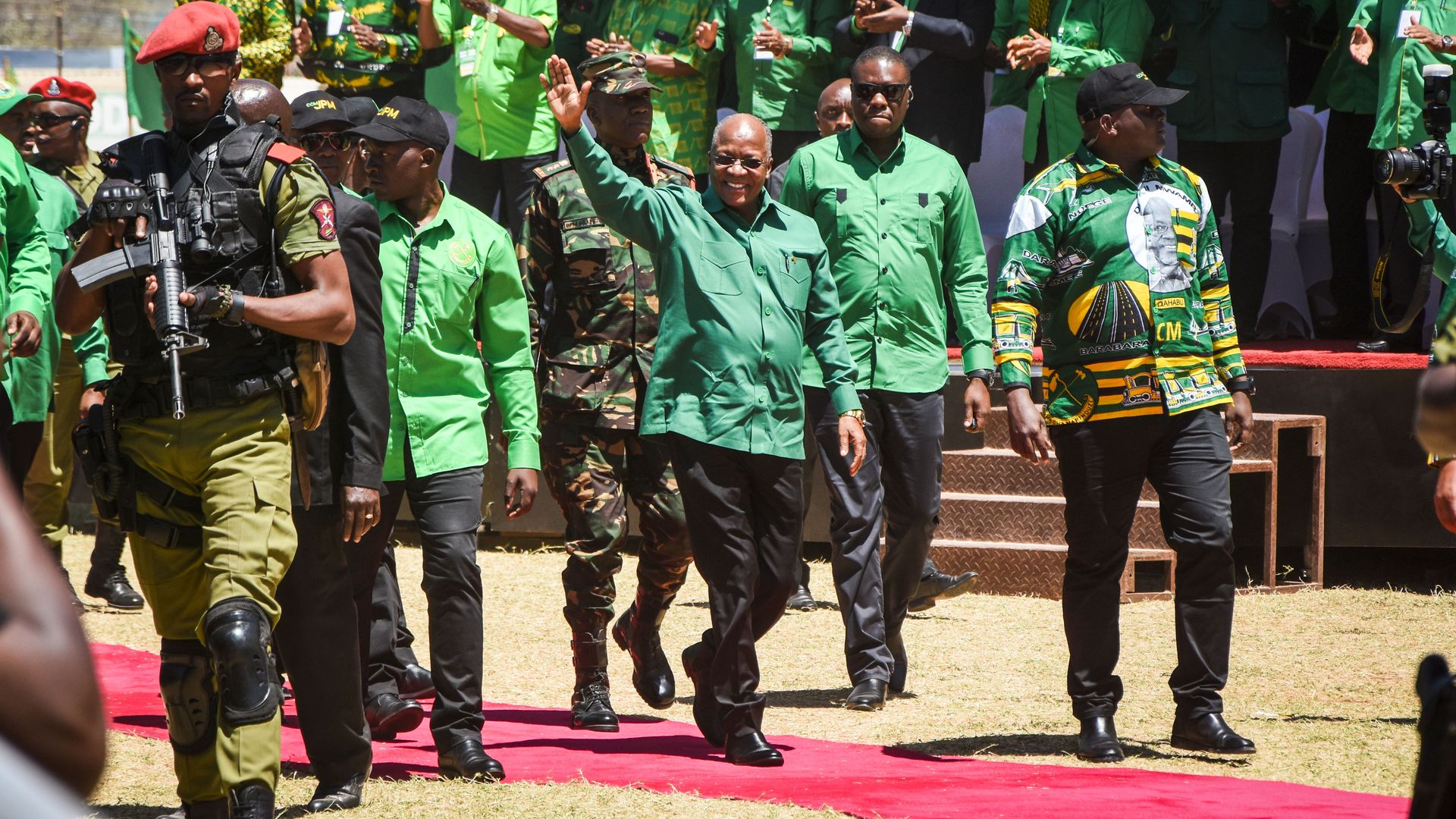 | | | Magufuli offers a wave on the campaign trail. Photo: Ericky Boniphace/AFP via Getty | | | | President John Magufuli placed Tanzania in a club that also includes North Korea and Turkmenistan by declaring victory over COVID-19 in June and subsequently blocking the release of any data that could contradict him. Driving the news: He has taken a similar approach ahead of Wednesday's presidential election — denying accreditation to election observers and banning media outlets that contradict the official line. - The electoral commission briefly barred Magufuli's main opponent, Tundu Lissu, from campaigning for using "seditious language" (he had complained that the election was unfair).
The big picture: Magufuli has shaped his reputation on fighting corruption and building infrastructure. - He was initially praised internationally for his image of austerity and incorruptibility, but he's now more often associated with political repression.
The other side: Lissu, who fled into exile in 2017 after being shot multiple times in an assassination attempt, returned in July to contest the election. - "If you cannot buy even your own food, goods roads do not matter," he has told attendees at his massive rallies.
- Magufuli's government banned independent opinion polls in 2018, so Lissu's claims of majority support are impossible to verify.
What to watch: Anything other than a clear victory for Magufuli would be a shock, as the playing field is clearly uneven and the ruling party has held power since 1961. In other news... At least 10 people have been killed in a post-election crackdown in Guinea, where President Alpha Conde was declared to have won a controversial third term. |     | | | | | | 5. What happened in Lagos |  | | | The gathering at the Lekki toll gate last Tuesday, prior to the crackdown. Photo: Adetona Omokanye/Getty Images | | | | Nigeria's president has called for "peace," and the top police official announced a mobilization of all available resources to end the ongoing "violence, killings, looting and destruction of property." The big picture: Youth-led protests against police brutality in Nigeria turned tragic last Tuesday after a brutal crackdown on peaceful protesters left at least 12 people dead, according to Amnesty International. - Since then, violence has broken out in several Nigerian cities, with widespread reports of vandalism and looting.
- The army has denied any involvement in Tuesday's crackdown despite evidence to the contrary.
- President Muhammadu Buhari made no mention of the attack when he belatedly addressed the country to call for calm.
What happened: Protesters had gathered at the Lekki toll gate in Lagos for the 13th straight day. According to a detailed reconstruction from the WSJ, the lights went out on the street shortly before 7pm. - A well-known DJ "warned the crowd that soldiers were reportedly heading for the toll gate, but said that if the demonstrators waved their flags and sung the [national] anthem, they would be safe."
- "Minutes later, the shooting began. They first heard the dull thud then whistle of tear-gas canisters, cloaking the area in an acrid yellow-colored smoke, followed by the crackle of bullets. Witnesses saw sparks flying from rifles of soldiers moving in formation."
- "At first, [protester David] Emmanuel was confused as to whether the bullets were flying overhead, until he heard screams. He kept singing the national anthem, but people began to sprint away."
Go deeper |     | | | | | | 6. What I'm reading: Cleaning up Russian politics |  | | | A Russian voter. Photo: Alexei Druzhinin/Sputnik/AFP via Getty | | | | The mayor of Povalikhino needed an opponent. In Russia's managed democracy, the ruling party nearly always wins — but not unopposed. "When he finally found who he thought was a willing patsy in the person of one Marina Udgodskaya, who cleans city hall, he thought his troubles were over," Andrew Kramer writes in the NY Times. - "But then she won. Nobody was more surprised than Ms. Udgodskaya, who did not campaign and who said she had agreed to run in the election last month only to help her boss."
- "She agreed to be sworn in, more than doubling her salary ... and settled into" an office which she previously cleaned.
Go deeper |     | | | | | | 7. Stories we're watching | 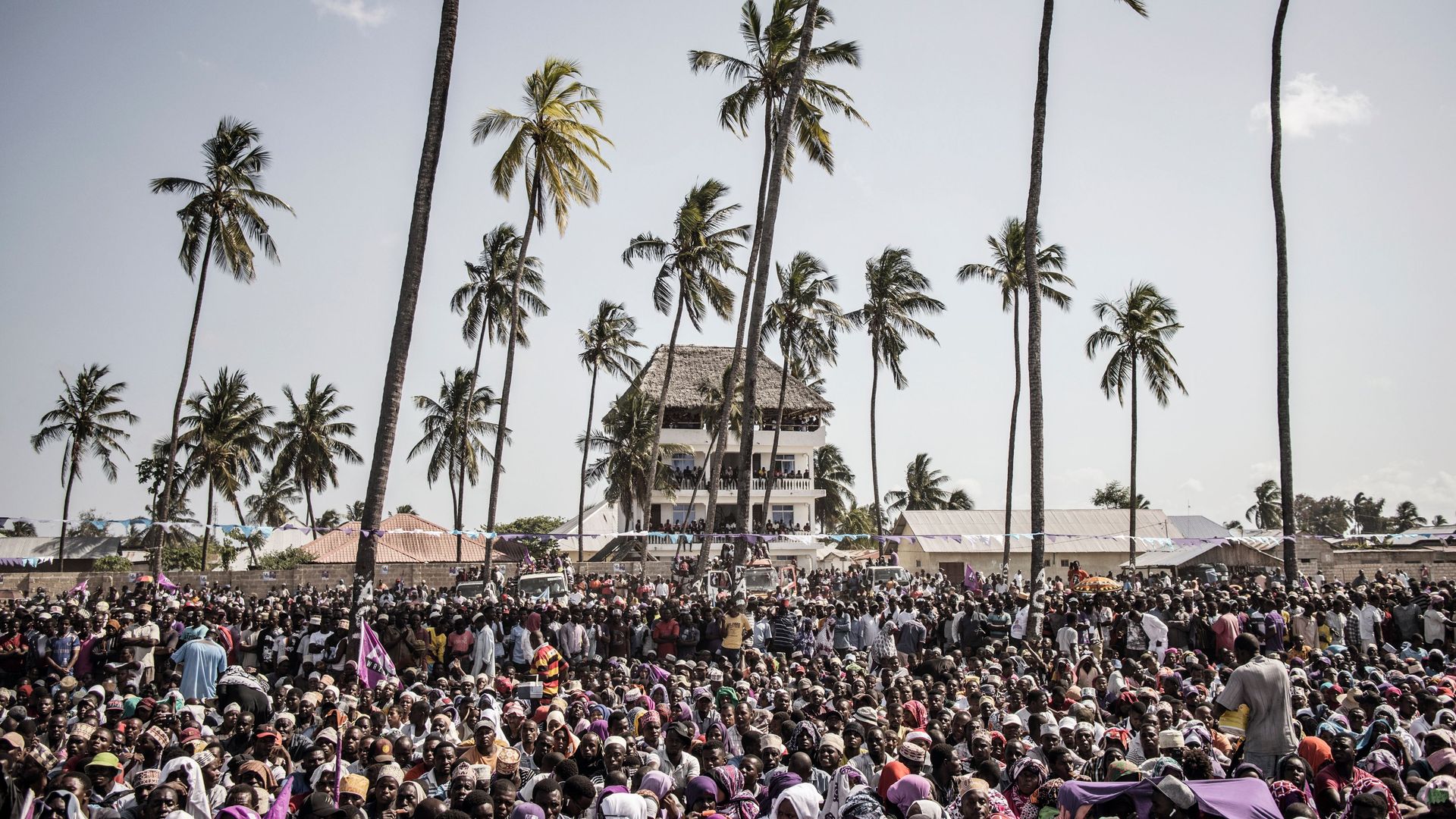 | | | An opposition rally in Zanzibar. Photo: Marco Longari/AFP via Getty | | | - Japan's big new climate goal
- Israel and Sudan begin normalization
- Opposition leader Leopoldo López flees Venezuela
- China to sanction Boeing, Lockheed, Raytheon over Taiwan deals
- Deadly suicide bombing in Kabul
- China's Ant Group preps largest-ever IPO
- France recalls ambassador to Turkey over Erdoğan comments
Quoted: "What's the problem of the individual called Macron with Islam and with the Muslims? Macron needs mental treatment." — Erdo ğan on Macron's response to the murder of a French teacher who showed cartoons of the Prophet Muhammad during a lesson on freedom of speech |     | | | | | | A message from Celadon Books | | Undaunted by John Brennan, former director of the CIA | | |  | | | | Hailed by The New York Times as "a rich portrait of his unusual life" and by The Washington Post as "a headstrong and unapologetic book, one whose author tells us what he really thinks," Brennan's brutally honest memoir is available now in hardcover, ebook, and audiobook (read by the author). Buy now | | | | | | Axios thanks our partners for supporting our newsletters.
Sponsorship has no influence on editorial content. Axios, 3100 Clarendon Blvd, Suite 1300, Arlington VA 22201 | | | You received this email because you signed up for newsletters from Axios.
Change your preferences or unsubscribe here. | | | Was this email forwarded to you?
Sign up now to get Axios in your inbox. | | | | Follow Axios on social media:    | | | | | |










No comments:
Post a Comment